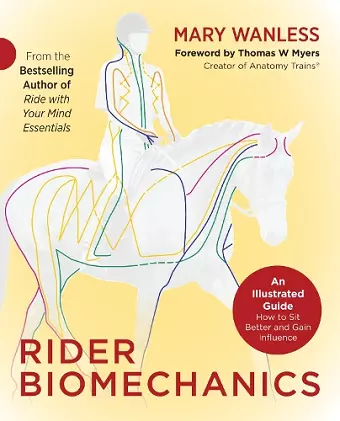Rider Biomechanics
An Illustrated Guide: How to Sit Better and Gain Influence
Format:Paperback
Publisher:Quiller Publishing Ltd
Published:12th Jun '17
Should be back in stock very soon

Rider Biomechanics begins by explaining fascia — the 'cinderella of body tissues'. Until recently, this was ignored by science, consigned to its apparent role as the body's packing material. However, research shows that, in reality, this biological fabric links muscles into functional chains, rather like strings of sausages.
Recent research has shown that the horse's fascial system is remarkably similar to our own, with equivalent 'lines of pull' that affect posture, movement, stability and mobility. Inevitably, the problems inherent in sitting and riding well are magnified when there is imbalance within and between the fascial 'guy-ropes' of rider and/or horse. We should realise that imbalance in either partner can send the other 'out of true', whilst the 'equipoise' of one partner helps the other to regain that poise.
By working through this book, you will learn to access and rebalance your own fascial net to significantly improve your stability, skill and 'feel'. Practical exercises, enhanced with copious photographs and diagrams, show how to balance your front and back, left and right — yielding skills that simultaneously address the equivalent imbalances in your horse.
Mary explains how effective force transmission within the fascial system enables riders to push their hands forward, taking away the temptation to pull on the reins. Later chapters show how twists and distortions in both human and horse can be addressed through accessing the fascial lines that wrap diagonally around the body. Lastly, a look at the core of both partners shows just how profound their connection can be.
If there is one equestrian author who single-handedly changed how we looked at riding it has to be Mary Wanless. Rider Biomechanics is an incredibly detailed book, beautifully illustrated with colourful diagrams and photographs which show the influence of the body, including the front and back lines as well as the influence the arms and spinal position has on the rider's ability to help or hinder the horse. This is such a long way away from the instructions of old where we were merely told to have a straight line from the horse's mouth to our elbows. I am sure there must be many a horse who, with a rider who is aware of what their body is doing, must think 'thank goodness for Mary Wanless!'. -- Jacqui Broderick
Mary Wanless – who's extremely well-known for her previous books dedicated to rider position (Ride With Your Mind) – has put more of her knowledge and training onto the pages or Rider Biomechanics... In some ways, she tells us, it can rather like the skin on a string of sausages – the fascia that is the fabric of our body, that is then the link into muscle and functional chains. 'Lines of pull'. Where the horse is concerned, these lines of pull are what we as riders, need to be aware of... Sounds simple here, but whether you tip forward, tip back, round your back or hollow it, draw your leg upwards, forwards or too far back, there is a complete explanation and reasoning behind it, through it and then working towards correcting it.
With disciplined training – we can all edge towards riding and looking as it we're sitting elegantly, not doing a lot!
-- Wendy Parsons * Essex Rider *
Mary teaches a centred, balanced approach to riding that's light years away from the 'heels down, head up' approach that many of us learnt as children. In her book, she concentrates on using the fascial system and core muscles to build a deeply balanced riding position that's in tune with the way the horse moves.
ISBN: 9781910016145
Dimensions: unknown
Weight: unknown
224 pages